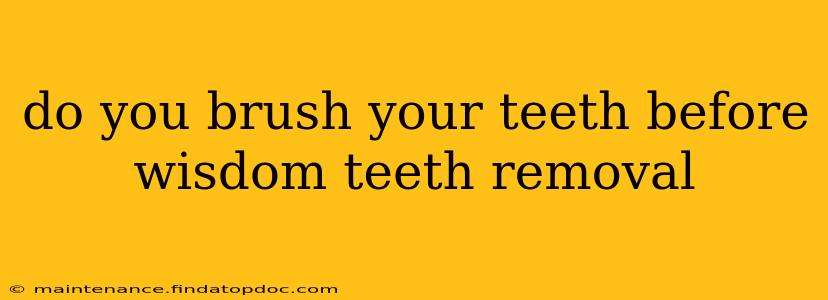Do You Brush Your Teeth Before Wisdom Teeth Removal?
The short answer is: yes, you should brush your teeth before your wisdom teeth removal, but with a crucial caveat. While maintaining good oral hygiene is always important, the way you brush before this procedure is key. Let's explore the best practices to ensure a smooth and safe extraction.
What should I do before my wisdom teeth removal?
Preparing for wisdom teeth removal involves more than just brushing your teeth. Your oral surgeon or dentist will give you specific pre-operative instructions, but generally, you'll want to:
- Brush gently: Use a soft-bristled toothbrush and brush gently. You don't want to irritate your gums before surgery.
- Floss carefully: Flossing is also recommended, but again, handle it with care to avoid any bleeding or injury.
- Avoid mouthwash: Many mouthwashes contain alcohol which can dry out your mouth and potentially interfere with the healing process post-surgery. Check with your dentist or surgeon if you have any questions about using mouthwash.
- Eat a light meal: Follow your surgeon's advice on what to eat and drink before the surgery. This often means avoiding heavy meals or anything that could increase nausea.
- Arrange transportation: You will be unable to drive yourself home after surgery due to the effects of anesthesia, so make sure you have a responsible adult to drive you.
Should I brush my teeth after wisdom teeth removal?
Brushing after your wisdom teeth removal is crucial for healing and preventing infection. However, you’ll need to do so carefully. Your surgeon will likely advise you to wait a few hours before brushing, and to do so extremely gently. Avoid brushing directly over the extraction sites.
How often should I brush after wisdom teeth removal?
You should brush your teeth gently at least twice a day after wisdom teeth removal, using a soft-bristled brush. Your surgeon will provide specific instructions tailored to your case.
When can I resume normal brushing after wisdom teeth removal?
The time frame for returning to your regular brushing routine varies depending on the individual and the complexity of the surgery. It's vital to follow your dentist or oral surgeon's instructions. They will advise you when it's safe to resume normal brushing without risking the extraction sites. Generally, this will be after the initial healing period (a few days to a week).
What happens if I don't brush my teeth before wisdom teeth removal?
While not brushing before your wisdom teeth removal won't directly affect the success of the procedure, it could lead to an increased risk of infection afterward. Having clean teeth and gums will help minimize the risk of post-operative complications.
Can I use mouthwash after wisdom teeth removal?
The use of mouthwash after wisdom teeth removal should be discussed with your surgeon or dentist. They might recommend a specific type of mouthwash or advise against using any until healing is complete.
What are the potential risks of poor oral hygiene after wisdom teeth removal?
Poor oral hygiene after wisdom teeth removal significantly increases the risk of infection, dry socket (a painful condition), and prolonged healing time. Maintaining a clean mouth is vital for successful recovery.
By following your surgeon's specific pre- and post-operative instructions diligently, you can contribute to a smooth and successful wisdom teeth removal and recovery process. Remember, open communication with your dental professional is key to ensuring optimal oral health.
